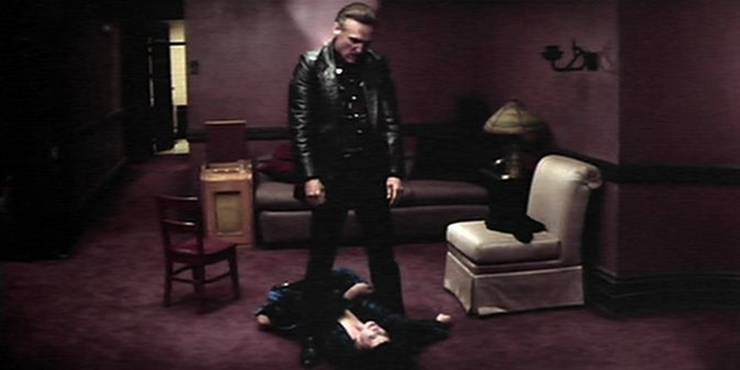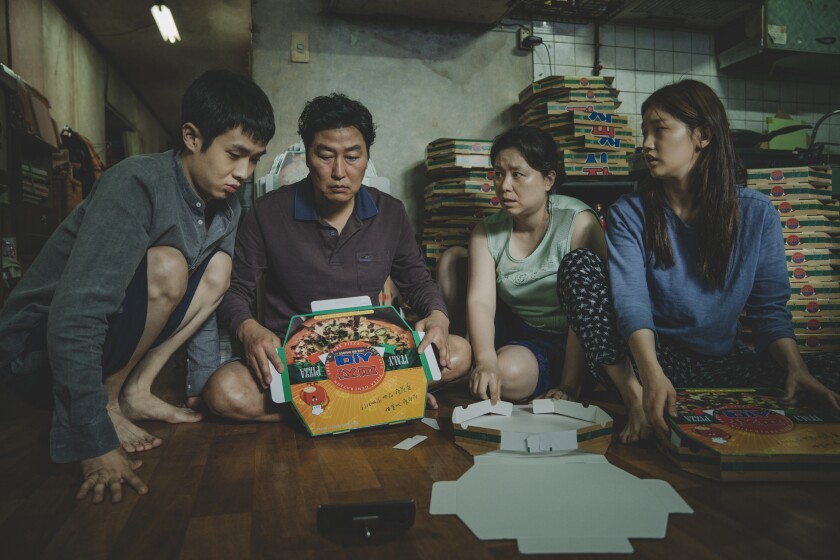Director: David Lynch
Pretty riveting, dark neo-noir type film which is the most accessible film I've seen from noted surrealist David Lynch.
I recall watching this one once before, about 20 years ago, though I had zero recollection of the second half of the movie. This means that I either fell asleep, or that I left the friend's house where we were watching it before it was over. Whatever the case, I'm happy that I finally went back to it.
The movie follows Jeffrey Beaumont (Kyle MacLachlan), a young man who returns to his cozy American town from college after his father is hospitalized after falling ill. While walking in a field near his neighborhood, Jeffrey makes the grisly discovery of a human ear lying on the ground. He takes the ear to the police, but can't seem to leave it at that. With the help of a police detective's daughter, Sandy (Laura Dern), he employs some amateur sleuthing techniques to dig deeper into the mystery. Before long, he is wrapped up with the sultry lounge singer Dorothy (Isabella Rosalini) and a maniac criminal, Frank (Dennis Hopper). Jeffrey is inexorably pulled into a dark, underground criminal world filled with drugs, violence, and depravity of a level that belies the otherwise peaceful-seeming town.
Blue Velvet is still pretty hypnotic, even after nearly 35 years, and certain elements almost seem like a practice run for some of what we would see in the original Twin Peaks TV show 4 years later. The most obvious one is the notion of dark, twisted forces lurking beneath the tranquil, All-American, white picket fence veneer of the setting. You have the attractive young couple in Jeffrey and Sandy, who seem to be falling in love, and we see more than a few nods to the idealist view of relationship from American suburbia from the 1950s and early '60s. It doesn't take long, though, before things get weird. Like, really weird. No sooner does Jeffrey sneak into the lounge singer Dorothy's house for some intel on a possible murder than he finds himself in a closet, peeping on her undressing, then seeing her brutally victimized by the unhinged, sexually warped madman, Frank. This dizzying dichotomy of light and dark has long been a part of David Lynch's works, and Blue Velvet was his earliest and probably still his most accessible example of it.
Then there are the technical merits of Blue Velvet. The movie just looks so good. And I don't mean to say that it's easy or always pleasing to watch. It's not. There are just too many disturbing and violent behaviors going on to say that you "enjoy" watching it. Still, it doesn't take an expert to see that the costumes, lighting, sets, and cinematography are masterfully designed and executed. There's such a rawness to most of the scenes involving Frank that most films won't employ. When Frank is terrorizing then raping Dorothy, there are no edits or camera maneuvers to spare the viewers of just how horrific he is. Similarly, when Jeffrey is basically abducted to the apartment where Dorothy's child is being held captive, there is such a skeevy, dangerous vibe that one can't help but feel like Jeffrey has ended up in some deceptively drab-looking circle of Hell. An easily overlooked part of these disturbing sequences is the lack of music, creating a silence that intensifies the horror. On the flip side, there are other scenes and moments that are very lush and stylized, showing off Lynch's range of techniques.
Like every David Lynch movie I've seen, I can only recommend it to people who are ready for something that's more than a little odd, twisted, and challenging in some respects. While the over-arcing story follows your typical crime thriller, the telling is much grittier, bizarre, and in your face than more popular fare in the genre. The best starting place for those who haven't seen Lynch's work is the original Twin Peaks TV show. If the darker elements of that program don't freak you out, check out Blue Velvet. From there, Lynch's work mostly gets darker and more surreal, so it's a logical next step.
Pretty riveting, dark neo-noir type film which is the most accessible film I've seen from noted surrealist David Lynch.
I recall watching this one once before, about 20 years ago, though I had zero recollection of the second half of the movie. This means that I either fell asleep, or that I left the friend's house where we were watching it before it was over. Whatever the case, I'm happy that I finally went back to it.
The movie follows Jeffrey Beaumont (Kyle MacLachlan), a young man who returns to his cozy American town from college after his father is hospitalized after falling ill. While walking in a field near his neighborhood, Jeffrey makes the grisly discovery of a human ear lying on the ground. He takes the ear to the police, but can't seem to leave it at that. With the help of a police detective's daughter, Sandy (Laura Dern), he employs some amateur sleuthing techniques to dig deeper into the mystery. Before long, he is wrapped up with the sultry lounge singer Dorothy (Isabella Rosalini) and a maniac criminal, Frank (Dennis Hopper). Jeffrey is inexorably pulled into a dark, underground criminal world filled with drugs, violence, and depravity of a level that belies the otherwise peaceful-seeming town.
Blue Velvet is still pretty hypnotic, even after nearly 35 years, and certain elements almost seem like a practice run for some of what we would see in the original Twin Peaks TV show 4 years later. The most obvious one is the notion of dark, twisted forces lurking beneath the tranquil, All-American, white picket fence veneer of the setting. You have the attractive young couple in Jeffrey and Sandy, who seem to be falling in love, and we see more than a few nods to the idealist view of relationship from American suburbia from the 1950s and early '60s. It doesn't take long, though, before things get weird. Like, really weird. No sooner does Jeffrey sneak into the lounge singer Dorothy's house for some intel on a possible murder than he finds himself in a closet, peeping on her undressing, then seeing her brutally victimized by the unhinged, sexually warped madman, Frank. This dizzying dichotomy of light and dark has long been a part of David Lynch's works, and Blue Velvet was his earliest and probably still his most accessible example of it.
Then there are the technical merits of Blue Velvet. The movie just looks so good. And I don't mean to say that it's easy or always pleasing to watch. It's not. There are just too many disturbing and violent behaviors going on to say that you "enjoy" watching it. Still, it doesn't take an expert to see that the costumes, lighting, sets, and cinematography are masterfully designed and executed. There's such a rawness to most of the scenes involving Frank that most films won't employ. When Frank is terrorizing then raping Dorothy, there are no edits or camera maneuvers to spare the viewers of just how horrific he is. Similarly, when Jeffrey is basically abducted to the apartment where Dorothy's child is being held captive, there is such a skeevy, dangerous vibe that one can't help but feel like Jeffrey has ended up in some deceptively drab-looking circle of Hell. An easily overlooked part of these disturbing sequences is the lack of music, creating a silence that intensifies the horror. On the flip side, there are other scenes and moments that are very lush and stylized, showing off Lynch's range of techniques.
Like every David Lynch movie I've seen, I can only recommend it to people who are ready for something that's more than a little odd, twisted, and challenging in some respects. While the over-arcing story follows your typical crime thriller, the telling is much grittier, bizarre, and in your face than more popular fare in the genre. The best starting place for those who haven't seen Lynch's work is the original Twin Peaks TV show. If the darker elements of that program don't freak you out, check out Blue Velvet. From there, Lynch's work mostly gets darker and more surreal, so it's a logical next step.









